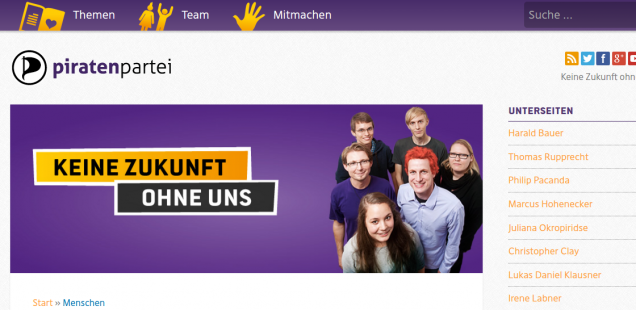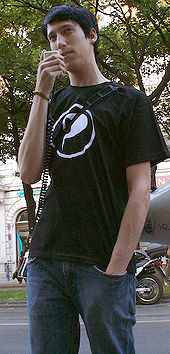Pirate Party of Austria – The First Ten Years | PirateTimes

Pirate Party of Austria – The First Ten Years
This is a guest post by Sylvester Heller
Editors note: The author has been excluded from the Pirate Party Austria. This article reflects solely his opinion and not that of PPAT
Austrian pirates were not the first to establish their political party, of course, but they were one of the first to follow Rick Falkvinge’s example. Today, Austrian pirates celebrate their tenth anniversary – a welcome opportunity for looking back over the past decade.
On July 31st 2006, the Pirate Party of Austria (PPAT) was registered in Vienna, the country’s capital. The founder, Florian Hufsky, then a teenager barely old enough to vote, had deep roots in the city’s milieu of anti-surveillance-activists, media artists and computer tinkerers.

Florian Hufsky — founding father, “Piratenpartei Österreichs”
A new party for a new century
In the old days, all people were not poseurs. Activism and attention were the currency of the realm. The Vienna of the naughties was home to a permanent avantgarde carneval of denizens who had become aware of each other on their beloved internet: tribes of passionate privacy advocates, open source professionals, rogue roboticists, toker liberation fighters, subversive ham radio operators, pioneering web missionaries, universal dada inheritors, grass-roots engineers, as well as students from various art schools and undercover informants sent by government entities.
Hufsky’s new Pirate Party did not get much attention at first. In the beginning, the Pirate Party of Austria became a magnet for strange, albeit gifted, individuals from the aforementioned carneval who took the format “political party” quite seriously. By 2009, the organization (or atleast its most lively members) were more criminal than the Bronx:
- they grew hemp in a pirate commune
- they cut stencils with lasers and sprayed graffiti
- they were interrogated by police after Anonymous Austria incidents
- they assembled legions of illegal raves
(Florian Hufsky was not responsible for any of that. The original Austrian pirates were founded on the premise that people bring their own crank into politics. And they did.)
A bid for the Viennese communal elections in 2010 failed, but who needs voters when there is propaganda by the deed? Happy days never last long enough. To the merry crew of party guerrillas, the bell tolled in early 2012, when the press and Austrian state television (!) discovered the “PPAT”. It was an accident, not a sell-out.
Halcyon days
When the German Pirates kept scoring at communal elections in 2011, the curiosity of Europe’s public was keenly aroused. In Austria, the whole country sat up and listened when Amelia Andersdotter (Pirate Party Sweden) moved into the European parliament in the winter of the same year. All of a sudden, hordes of people loved the Pirate Party of Austria. In April 2012, as many as 30 new members enrolled — in a day.
For established politicians, the sight must have been frightening. The country was looking forward to a big national election in 2013, and the electorate had become extremely uppity and unpredictable already. “The Man”, in his evil plotting, commanded the press to reverse the trend and bash the pirates into oblivion. This was very easy, because with popularity and the proposition of being elected into high offices came envy and intra-partisan strife among the new members who did not know the first thing about computers, privacy, cyber-weapons, hash or art. Public bar brawls and drunken fits suit actual pirates well, but not pirate politicians. The yellow press in particular had a field day. At the same time, passionate bureaucrats erected a complicated federal system with hierarchies of study groups and spokespersons, as well as an elaborate server landscape with a myriad of channels.
By that time many of the first adopters and tinkerers jumped ship and took most talent, political will and layouting capabilities with them. Nerds, even political and artsy nerds, suck at ceremony and cabal (which is what had become the new focus of the organization).

Philip Pacanda — a respected pirate councillor in the city of Graz
Despite obstacles and tarnished reputation, the Styrian chapter made waves in 2012 by establishing a pirate beachhead in the city council of Graz. The pirates in the county of Tyrol managed to install another councillor, but shortly before the success a schism resulted in a separated Tyrolean Pirate Party, which in turn ejected the soon-to-be-figurehead. (Simplified narrative. Records were lost in the fog of war.)
Hufsky did not live to see the most interesting twists in the story of the organization he had founded. It is tragic that Hufsky committed suicide in 2009.
At the time of the Austrian national elections in the fall of 2013, the operational capabilities for running a campaign had shrunk significantly. Instead of a Swedish or German surprise, the Austrian pirates had to content themselves with 0.79% of the votes. The member count stood at more than a thousand, but started to decline immediately after the modest election result became public.
Legacy
In the years since then, the Pirate Party of Austria did the pragmatic thing and joined forces with various other small parties, sometimes successfully. In 2014, a cooperation headed by the Austrian Communist Party set new standards for campaigning on a shoe-string budget and scored unprecedented exposure on the street and in the media. The goal, moving into the European Parliament, could not be met, but the experience of actually having an effect on the political scene managed to revitalize the party for another year or so.
Not everybody liked the Communists, of course, thus the new pirate spirit was bought with more blood-letting, in terms of member count and volunteer talent. Members parted over popular issues like gender equality, importance of standing up to fascism vs. traditional pirate topics like surveillance and net neutrality.
Last year, the spirit of rocking the boat made a brief comeback with a political porno operation that was reported around the globe. The party bought advertising space on Youporn and had the portrait of Austrian minister for internal affairs, Ms. Johanna Mikl-Leitner, flicker over the screens of horny voters. The slogan was to the effect of “Johanna likes to watch” — an allusion to a proposed internet-sniffing bill. This did not sit well with the males in the audience who complained about flaccidity issues upon confrontation with Mikl-Leitner’s homely likeness. A scandal ensued. The porn buccaneers had to discontinue the ads in the name of lust without impediment. Mikl-Leitner’s lawyers also asked the party to stop the frolicking immediately.
An interesting (but contested) feature of Austrian pirates is their reliance on the German voting software Liquid Feedback. The PPAT uses a modified version for most binding decisions and most of the details in their humongous party programme. The pirates in Graz even gave the local electorate access to a public Liquid server for influencing communal politics. Both applications have their problems, but there are most certainly lessons to learn and stories to tell from this worthy ongoing experiment.
Today, the most lasting effect of the Austrian Pirate Party can probably be found outside the organization. For many people who had joined during the gold-rush of 2012, the pirates with their low barrier to entry and attractive issues were their first contact with civil society and politics in general.
More than a handful of those pirate alumni have joined more specialized (often much older) organizations. They are not marooned — many help with protests, file petitions, give talks, collect signatures and keep in contact with each other. Some of the folks have even founded their own NGOs and advances pirate causes like hemp liberation. In this sense, immersion in the Pirate Party of Austria was a life-changing and awakening experience for many persons, who would never have dreamed of joining a conventional political party.
As for the modern Pirate Party of Austria, over 80 die-hards remain. With no elections before 2017, the pirates don’t have much to worry about in terms of campaigning. Current operations include periodical public meetings for recruiting new members and collecting signatures for reform for more direct democracy and easier participation in Austrian politics. Pamphlets have become more polished, the daily beat on Facebook runs well and attracts a growing audience. As in the early days, all bets are off what will happen next.
Links and further reading
Virtually all of the Austrian pirates’s texts are in German. The English-language items and video are indicated.
- Earlier articles by Pirate Times on Austrian pirates (English).
- The press review is fairly comprehensive (but dated).
- The PPAT has spawned several new organizations. Austria’s leading hemp liberators, the annual Vienna Peace Parade (VIDEO in English!), Austrian Society for Democracy, a Viennese club for blogging for and campaigning with the KPÖ (Austria’s communist party), as well as numerous blogging and protesting initiatives. Three former federal executives are very active in the most professional AK Vorrat, an anti-surveillance organization that has successfully sunk several bills. Many more political blogs and one-man-shows also exist, but not all of them have websites and current activity.
- Website, wiki, forum, facebook, twitter, google+, youtube
 Sylvester “Hellboy” Heller served as the Austrian Pirate Party’s press officer and as federal board member from 2011 through 2012. A rant about the struggle between “traditionalists” and “leftists” can be found in an unofficial forum (English). This author (yours truly) leaves no doubt about whose side he is on.
Sylvester “Hellboy” Heller served as the Austrian Pirate Party’s press officer and as federal board member from 2011 through 2012. A rant about the struggle between “traditionalists” and “leftists” can be found in an unofficial forum (English). This author (yours truly) leaves no doubt about whose side he is on.
Featured image: Screenshot from PPAT website.
Other images:
-Florian Hufsky, CC-BY-SA 3.0 Kewagi
-Philip Pacanda, CC-BY-SA 3.0 Philip Pacanda
-Sylvester Heller, CC-BY-SA 3.0 Sylvester Heller
About
All content is CC-BY if not mentioned otherwise. Please link back to us if using content.











Recent Comments